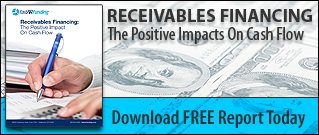 CASH IS KING … repeat after me …
CASH IS KING … repeat after me …
CASH IS KING!
If there’s one point I’ve been trying to drive home it is that cash is king.
What I mean is, in order to successfully and efficiently run a business, you must have cash. I don’t think it’s any big secret. No matter what industry you’re in, you must
have cash to meet daily needs:
- Meet that all-important Friday payroll
- Keep your vendors happy
- Buy inventory
It really doesn’t work when you don’t plan out your cash flow. You should plan your cash needs around what vendors are coming due, how much your payroll is and any other obligations. In addition, you should always have cash reserves.
Why Don’t You Try Factoring
If you own a business and you find that you’re having a hard time managing your cash and you really want to start improving cash flow, what you should consider is a factoring program.
Factoring is a form of cash flow financing where you sell your company’s receivables for creditworthy customers to a third party known as a factor. Advance rates do vary, but are typically around 80%. Once the invoice is paid, you get the remaining portion back less any applicable fees.
There are two different types of factoring, recourse and non recourse. Recourse factoring is where you are financially responsible for the invoice if the invoice isn’t paid. Non recourse is the opposite.
The Reasons
Going back to the title of my article, there are many reasons to invest in a factoring line. What I’d like to do is outline what I feel are the most important reasons to invest in a factoring line.
- Bridging The Gap: Factoring helps bridge that gap between when you bill your customer for products or services and when the invoice is collected.
Many companies work hard to stretch payments to you. Customers stretch out payments to 30, 60 and even 90 days. There’s no way to pay the bills on time if it’s taking too long to collect your receivables.
All too often I’ve found business owners have a difficult time keeping their cash flow organized. It often comes back to one point: trying to adequately manage receivables and stay on top of collections. Which leads into my second point.
- Accounts Receivable Management: If you have a difficult time staying on top of your receivables, the factoring company monitors the receivables that you factor.
They want to make sure invoices are paid as much as you do. In their due diligence process they find out if there are issues with invoices and notify you rather quickly.
- Not A Long-Term Commitment, Won’t Cost An Arm And A Leg: A factoring line is considered short-term financing. If you take out a factoring line, then you’re not looking at a long-term commitment to a bank.
While there is a fee for improving your cash flow by factoring your receivables, it won’t break the bank. Depending on the factoring company you choose, fees are based on how far an invoice ages out. If you choose to factor only some of your receivables, then look at only factoring your customers that pay the fastest. It saves you some money while improving your cash flow.
Having a factoring line in place gives you the ability to start managing your cash flow better.
Fast A/R Funding specializes in helping small businesses bridge the cash flow gap with factoring. Click below to increase your business' cash flow, or call 888.833.2286 to speak with one of our small business finance consultants.










